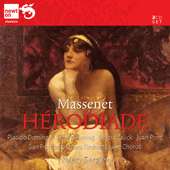|
Back
10/22/2013
Jules Massenet: Hérodiade
Dolora Zajick (Hérodiade), Renée Fleming (Salomé), Plácido Domingo (Jean), Juan Pons (Hérode), Kenneth Cox (Phanuel), Kristin Clayton (A Babylonian Maiden), Hector Vásquez (Vitellius), Alfredo Portilla (A voice in the temple), Eduardo del Campo (The High Priest), San Francisco Opera Chorus, Ian Robertson (Chorus Master), San Francisco Opera Orchestra, Valery Gergiev (Conductor)
Recording: War Memorial Opera House, San Francisco, California (November 5, 8, 12 and 15, 1994) – 153’31
Newton Classics # 8802202

   
Surprisingly, Jules Massenet’s career hit a stumbling block after the successful opening of his grand opéra, Le Roi de Lahore in 1877. Writing music set against a biblical backdrop had its own price to pay with the Parisian community. Take the example of Camille Saint-Saëns’ Samson et Dalila which, with the help of Franz Liszt, had its premiere in Wiemar in 1877 instead of in France. Massenet gave the completed Hérodiade to Paris Opéra’s newly appointed director Auguste-Edouard Vaucorbeil for review in 1881. Vaucorbeil turned it down, stating “I do like your music, but as for the libretto, you badly need an author who knows how to build the skeleton of a play." This polite reply really hid a deeper truth: both of the aforementioned works were of an amorous, lustful nature upon which the composers built their musical constructs. Shunned by the prestigious venue, Jules Massenet accepted an invitation by the more open minded Théâtre de la Monnaie in Brussels. It wouldn’t be until 1921 when Hérodiade would finally return to Paris and settle down in its originally intended venerable location.
The overall clarity of this 1994 live recording within San Francisco’s War Memorial Opera House is remarkably good. Despite a sliver of echo, the issue fades away since the cast of Hérodiade is sans tache. In comparison to Strauss’ better-known Salome, packed with ‘shock value’, Massenet’s more romantic Hérodiade has its own set of challenges. Due to Massenet’s weighted, majestic and grand music, it requires major principals bearing formidable vocal strength when up against the immensity of the orchestra. It is a rare occasion to have such an assemblage of high caliber singers under one roof, and we are fortunate to hear the marvelous executions from such well-known and well-respected artists. Valery Gergiev rolls the San Francisco Orchestra through the ‘musical wringer’, squeezing out every ounce of instrumental delight in order to yield a well-laundered cloth of Massenet finery.
Renée Fleming is a master interpreter of Massenet and here we find her continued consistency in lyrical tenderness yet powerful support. Plácido Domingo, then age 53, is in exceptional form. His voice shines with brilliance and clarion diction; Jean’s Act IV opening “Ne pouvant réprimer” is stupendous, especially when Domingo ends on a high A with flawless execution and extension. The Fleming/Domingo ‘Love Duet’ (“Calmez donc vos fureurs”) concluding Act I possesses restrained amorousness and charm. Juan Pons’ Hérode fills the air with an effortlessly light, feathery baritone register during his “Introduction.” One of the greatest attention-getters is Dolora Zajick singing the title role, simply due to the proportions of vocal magnanimity. This accomplished mezzo-soprano interprets Hérodiade splendidly, pulsating with tension, at times forceful, at times nagging, all compacted into a steely frame.
Found in many of his operas, Massenet was a master in developing musical motifs associated with each of the principal characters. This technique is strongly represented in Hérodiade, similar in scope to his Manon of 1884. Structurally, one finds close parallels to Samson et Dalila initiating with San Francisco Opera Chorus’ wonderful dialogue, “Alerte! Levez-vous! Le palais est ouvert!” that recalls the heavier laden Hebrew lament found in Samson. In Act IV, Scene II we find masculine energy stirring inside the men’s chorus (“Romains! Nous sommes Romains!”) reminiscent to Verdi’s “Triumphal March” from Aïda (1871). Immediately following is Massenet’s small ballet sequence introduced with the strings’ intense tremolo (“The Girls from Gaules”) and ending in a Bacchanal laden dervish. Heavy dosing of flutes opening Act II (“Danse Babylonienne”) is stamped with like cadences found in Bizet’s “Danse bohémienne” from Carmen (1875).
The booklet contains only English translation. There is no libretto (nor was one found online), and the synopsis a bit sparse and sloppy (i.e. some of the cast names are listed in English while others are listed in French.)
It is difficult to know why Massenet’s Hérodiade is infrequently performed. Although overshadowed by Manon, Werther and more recently, Thaïs, this dramatic opera will find one’s mouth agape. Few recordings exist with such a phenomenal cast.
Christie Grimstad
|